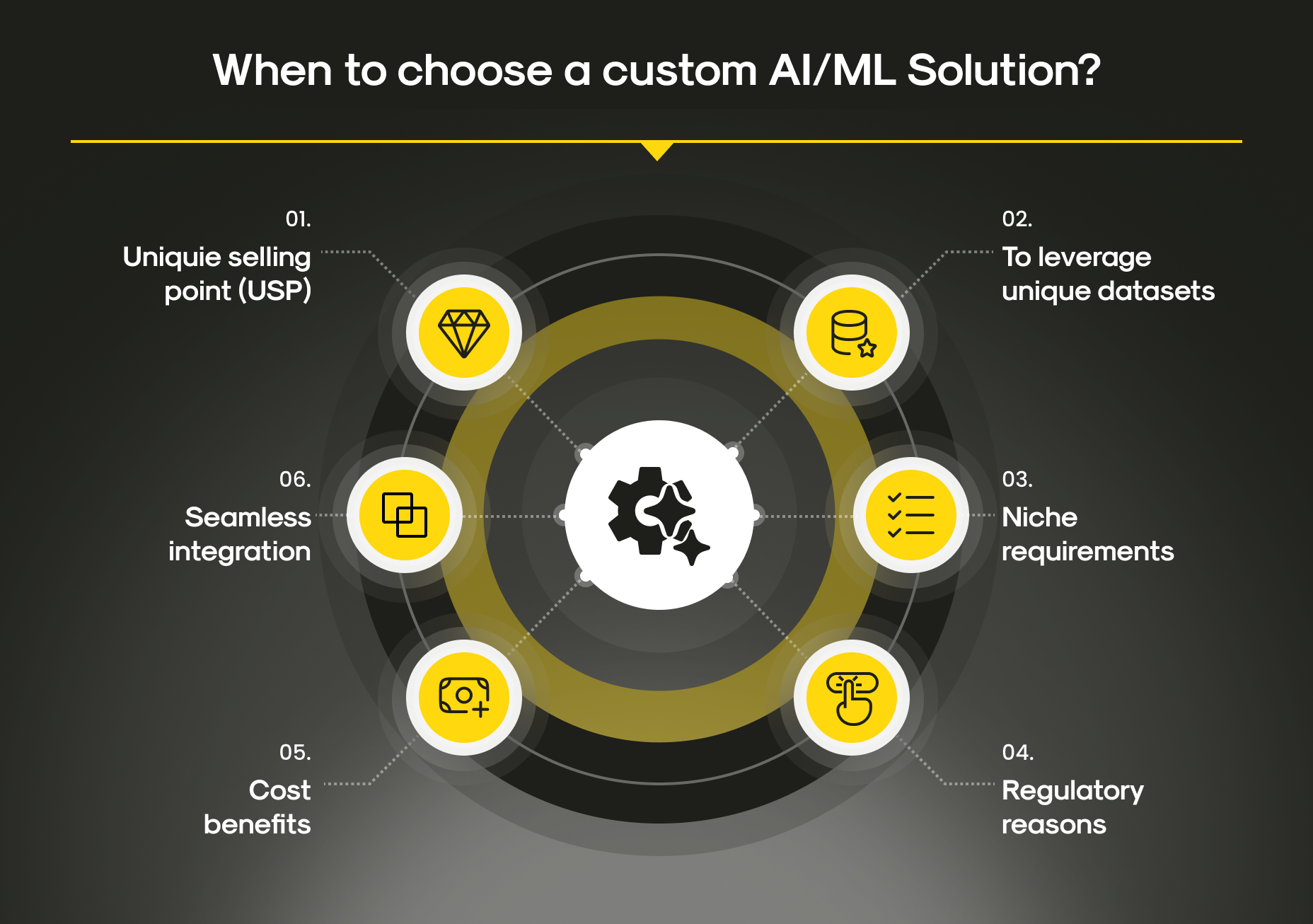Nowadays, artificial intelligence (AI) has become the engine behind modern customer engagement. From AI chatbots in customer service to full-scale AI customer service software, businesses are under pressure to decide: should they adopt an off-the-shelf solution, or invest in a custom AI solution tailored to their unique workflows, compliance needs, and data strategy? The choice impacts not only performance, but also cost, scalability, and data ownership over time.
Off-the-shelf AI for customer service: fast, accessible, but limited
Let’s start with the basics, shall we? So what are off-the-shelf AI platforms? Well, think plug-and-play AI chatbots for customers. You can deploy an AI customer service agent in days, automate FAQs, and reduce call volume without heavy technical lift.
Advantages of off-the-shelf AI
- Low upfront cost. Licensing models are predictable and often subscription-based.
- Speed of deployment. Minimal integration required, often with native connectors.
- Continuous upgrades. Vendors handle model training, patching, and scaling.
Limitations of off-the-shelf AI
- Generic training data. The AI may not understand your domain, tone, or brand voice.
- Customization limits. While you can tweak flows, deep customization AI options are often restricted.
- Data control risks. Sensitive customer data may be processed on vendor servers, raising compliance questions.
- Scaling costs. What seems cheap upfront can become expensive at scale with high per-interaction charges.
In short, off-the-shelf customer service AI software can be ideal for small businesses that need immediate relief in handling support volumes. But for enterprises or regulated industries, the lack of control can become a strategic liability.
What is a custom AI solution?
A custom AI solution is built to fit your specific processes, domain language, and compliance framework. Unlike generic AI software for customer service, custom AI solutions ingest your data, adapt to your customer journey, and often integrate directly with internal CRMs, ticketing platforms, or knowledge bases.

When to choose a custom AI/ML solution
Examples include:
- A custom GPT AI chatbot solution trained on your support documentation.
- A custom AI chatbot that integrates billing logic and recognizes product SKUs.
- Custom AI voice assistants tailored to handle inbound phone support with domain-specific vocabulary.
Benefits of customized AI solutions
- Brand-specific tone. A customer AI system speaks like your company, not like every competitor using the same vendor.
- Deeper integration. APIs connect directly to your back-office tools for real-time problem resolution.
- Data sovereignty. Your team decides how data is stored, processed, and retained.
- Scalable efficiency. Costs are aligned with usage rather than escalating subscription fees.
In fact, custom AI does take more time to build and test. That’s where a custom AI development company becomes essential, bringing expertise in both customized AI architectures and the operational realities of scaling customer service.
Decision criteria: custom AI vs. off-the-shelf
When evaluating whether to adopt an off-the-shelf platform or invest in custom AI development, consider these decision points.
When it comes to time to value, off-the-shelf solutions win with instant deployment. In contrast, a custom AI solution takes longer to develop but ultimately aligns much more closely with a company’s business goals.
The cost structure also looks different. Off-the-shelf software usually comes with subscription or per-interaction fees that feel predictable early on but can become expensive at scale. A custom build requires a higher upfront investment, yet over 12-24 months the marginal costs tend to be lower.
Data ownership is another critical factor. With off-the-shelf platforms, the vendor typically controls or processes customer data, which can create both dependency and risk. Custom AI customer service software, however, g]ives businesses full control over their sensitive datasets.
Compliance needs can’t be ignored either. Off-the-shelf products may fall short of strict regulations such as GDPR or HIPAA, while customized AI solutions can be designed from the ground up with compliance and auditability in mind.
Finally, the customer experience reveals the starkest difference. Off-the-shelf AI often feels scripted and predictable, sometimes even robotic. A true customized AI solution, on the other hand, adapts dynamically to customer emotions, past interactions, and preferences, creating a far more natural and engaging experience.
Hybrid patterns: APIs + fine-tuning
As of today, many businesses choose a hybrid approach, leveraging large off-the-shelf models (via APIs) while adding fine-tunes and domain-specific data layers to create custom AI solutions. This approach balances speed with control.
Hybrid examples:
- Using an off-the-shelf AI customer service agent API for natural language processing, but fine-tuning it with your product manuals.
- Combining custom GPT AI chatbot solutions with an external knowledge base that updates in real time.
- Embedding customer service AI software into workflows via APIs, then layering in custom AI voice features for phone support.
Hybrid patterns offer flexibility. You gain access to continuously improving foundation models, while still benefiting from customization AI options that fit your brand and processes.
TCO over 12-24 months: overview
In 2025, the initial sticker price often misleads decision makers, which is why calculating the true total cost of ownership (TCO) requires a deeper look. Licensing and infrastructure costs differ significantly between models. Off-the-shelf AI comes with predictable monthly fees, but those fees scale linearly with interaction volume. A custom AI solution, by contrast, requires a higher upfront investment in development and cloud infrastructure, yet the costs tend to flatten as usage grows.
Operational efficiency also plays a role in long-term economics. Off-the-shelf platforms may demand additional staff to handle escalations when the AI cannot adapt to complex cases. Customized AI solutions, however, reduce those escalations through deeper integration and smarter automation, saving both time and resources.
Iteration costs provide another distinction. With off-the-shelf software, updates arrive only when the vendor releases them, limiting how fast a business can adapt. A custom approach keeps iteration fully under your control, allowing improvements to compound over time and strengthen performance.
Finally, opportunity cost is often underestimated. Off-the-shelf systems get you to market quickly but risk delivering a generic, “me-too” experience. A custom AI solution takes longer to ramp up but creates defensible competitive differentiation that competitors can’t easily replicate.
When modeled over a 12–24 month horizon, custom AI solutions frequently show stronger ROI, particularly for high-volume enterprises handling tens of thousands of customer interactions each month.
Data ownership and sovereignty
In customer service, data ownership is not just a legal checkbox, it’s a strategic asset. Off-the-shelf platforms may process your data for model training, meaning your customer interactions help improve their product (and potentially competitors’ tools).
A custom AI solution ensures customer AI data stays within your ecosystem, secured to your compliance requirements. This is particularly crucial in:
- Healthcare (HIPAA compliance).
- Finance (PCI DSS, GDPR).
- Education (FERPA).
Beyond compliance, data sovereignty gives you leverage to continuously improve customized AI solutions without relying on vendor roadmaps.
The role of a custom AI development company
Building custom AI solutions requires specialized expertise, from data engineering and ML ops to conversational design and regulatory compliance. A custom AI development company brings:
- Proven experience in deploying AI customer service agents across industries.
- Toolkits for designing custom GPT AI chatbot solutions aligned with brand tone.
- Knowledge of AI software for customer service integrations with CRMs, ERPs, and ticketing tools.
- Ongoing optimization to keep your custom AI chatbot or custom AI voice system relevant as your business grows.
Working with the right partner turns a complex AI build into a staged process: MVP chatbot, fine-tuned agent, and eventually a full suite of customer service AI software.
How Mitrix can help
At Mitrix, we help startups and enterprise teams embed AI that thinks like their business. We help founders build smart, secure, business-ready AI tools, but without blowing the budget. Because in 2025, speed and control are crucial. We offer AI/ML and generative AI development services to help businesses move faster, work smarter, and deliver more value.
Custom AI copilot development
- Tailored AI assistants for specific business operations (e.g., finance, legal, HR)
- Integration with internal tools (Slack, Microsoft 365, CRMs)
- Context-aware, role-specific assistants
RAG (Retrieval-Augmented Generation) systems
- Building LLM apps that combine real-time data search with AI response
- Often used in customer support, internal knowledge bases, and legal tech
Private LLM deployment
- On-premise or private cloud deployment of open-source models (e.g., LLaMA, Mistral, DeepSeek)
- Security- and compliance-focused use cases (e.g., in healthcare, finance, or legal)
Fine tuning and customization
- Fine-tuning open-source models on proprietary data
- LoRA, QLoRA, and full finetuning of LLMs
- Domain-specific model training and quantization (e.g., legal, finance, medical)
AI integration for legacy systems
- Connecting LLMs to ERP/CRM/accounting systems (e.g., SAP, Dynamics GP, Salesforce)
- Creating natural language interfaces for complex backend systems
AI chatbots and virtual agents
- Advanced AI-powered customer service bots
- Multilingual support, emotion detection, dynamic memory
- Used in retail, banking, and healthcare
Voice AI and speech-to-text solutions
- AI transcribers and voice assistants for customer support or medical dictation
- Custom Whisper-based or Speech-to-Text integrations
Plus, we support deployments across cloud, on-prem, and hybrid environments with full compliance alignment (GDPR, HIPAA, SOC2). Curious how to go from free tool testing to building AI that gives you a real edge? Let’s talk.
Summing up
In all fairness, the decision between off-the-shelf and custom AI solutions is not binary. Many companies begin with ready-made AI bots customer service tools, then evolve into customized AI systems as their needs mature.
Off-the-shelf
- Quick wins.
- Low barrier to entry.
- Risk of generic experiences.
Custom AI
- Higher upfront investment.
- Stronger control, compliance, and differentiation.
- Better long-term TCO for scale.
Ultimately, the goal is not just to deploy an AI customer service agent, but to craft a defensible customer experience strategy. Whether through hybrid models, direct builds, or working with a custom AI development company, the right path depends on your scale, budget, and regulatory environment.
In 2025 and beyond, the winners in customer service will not simply use AI: they will own it, shape it, and align it to their unique business DNA. That’s the true promise of customized AI solutions for businesses of all sizes.

